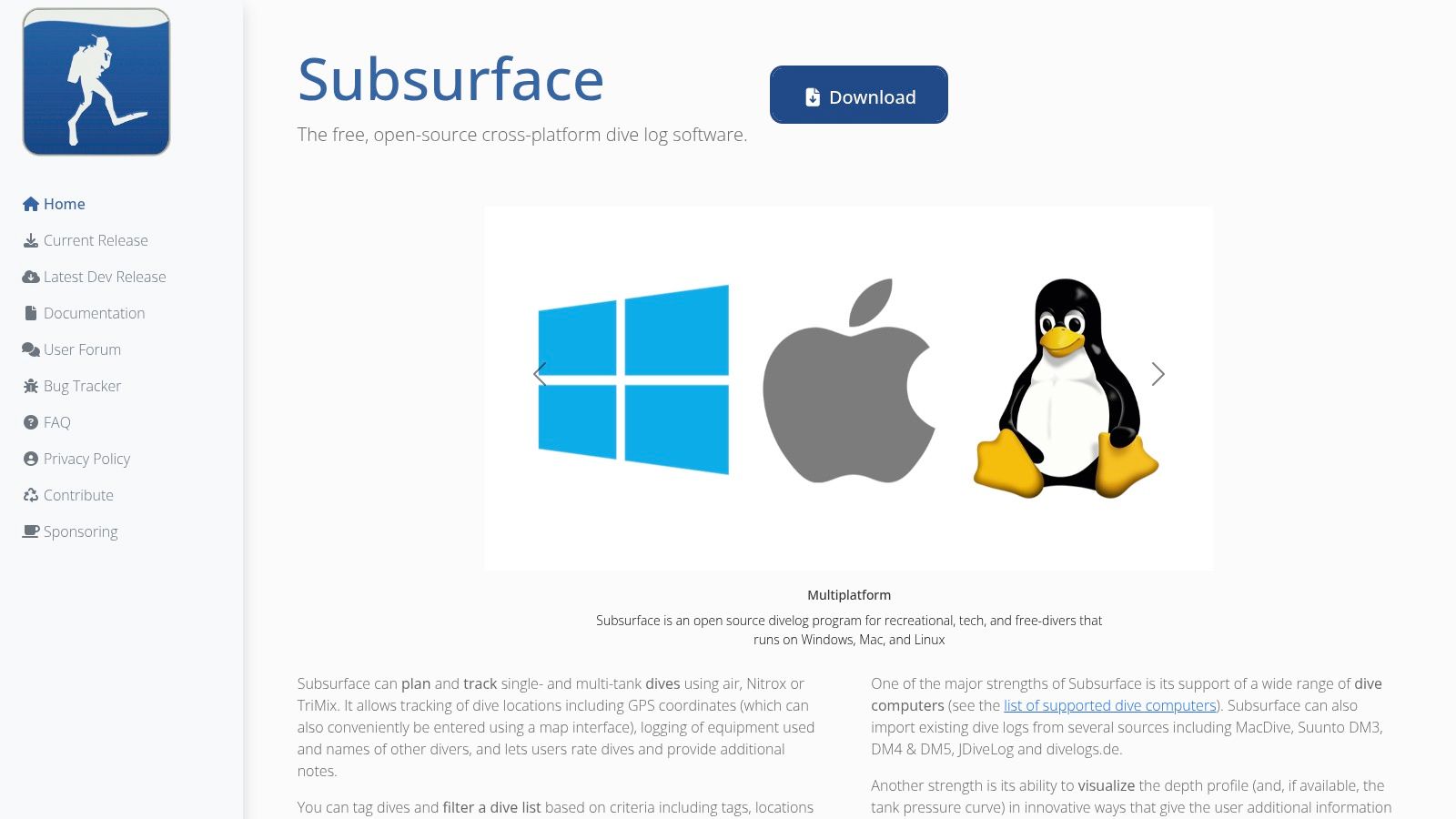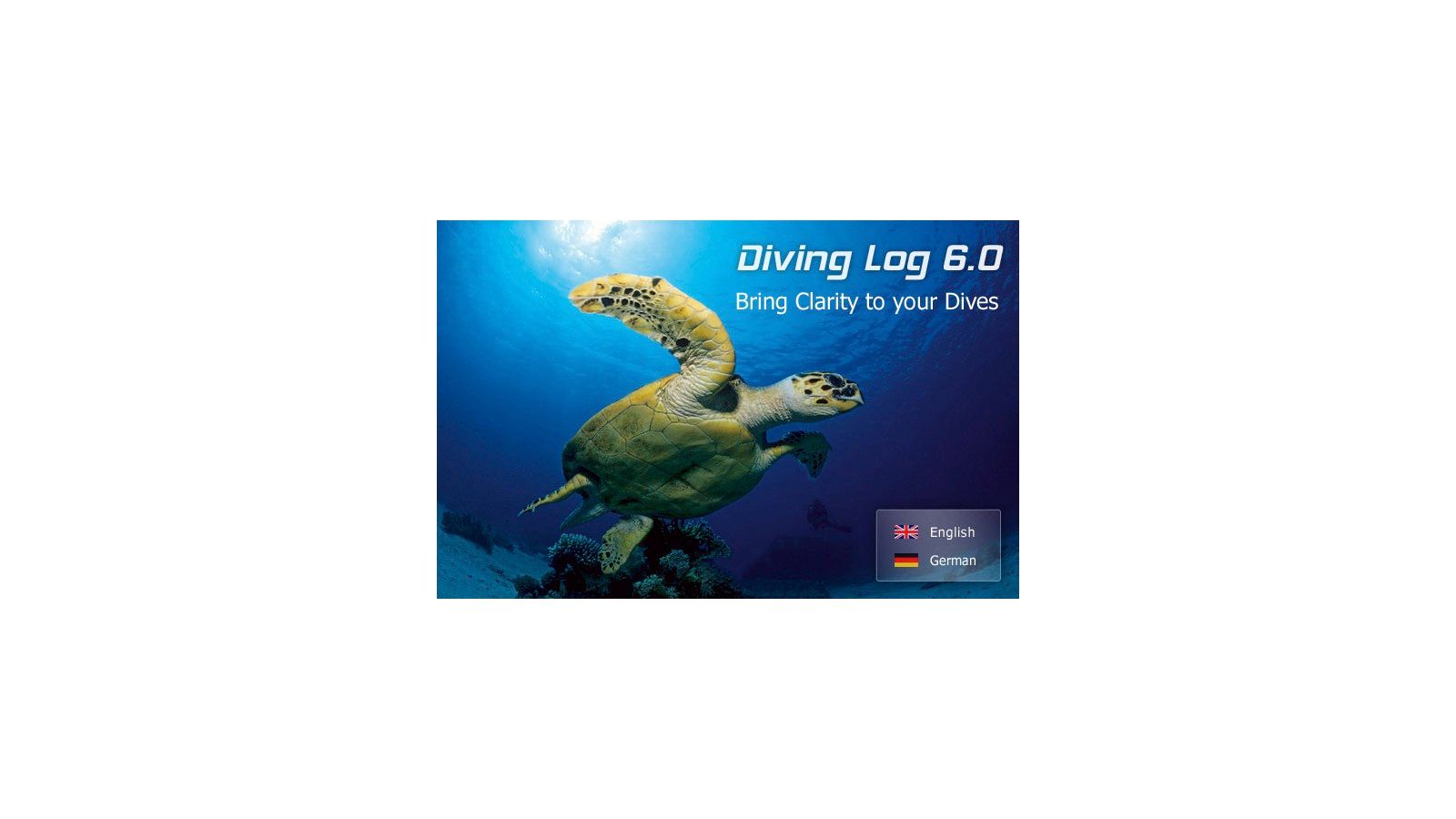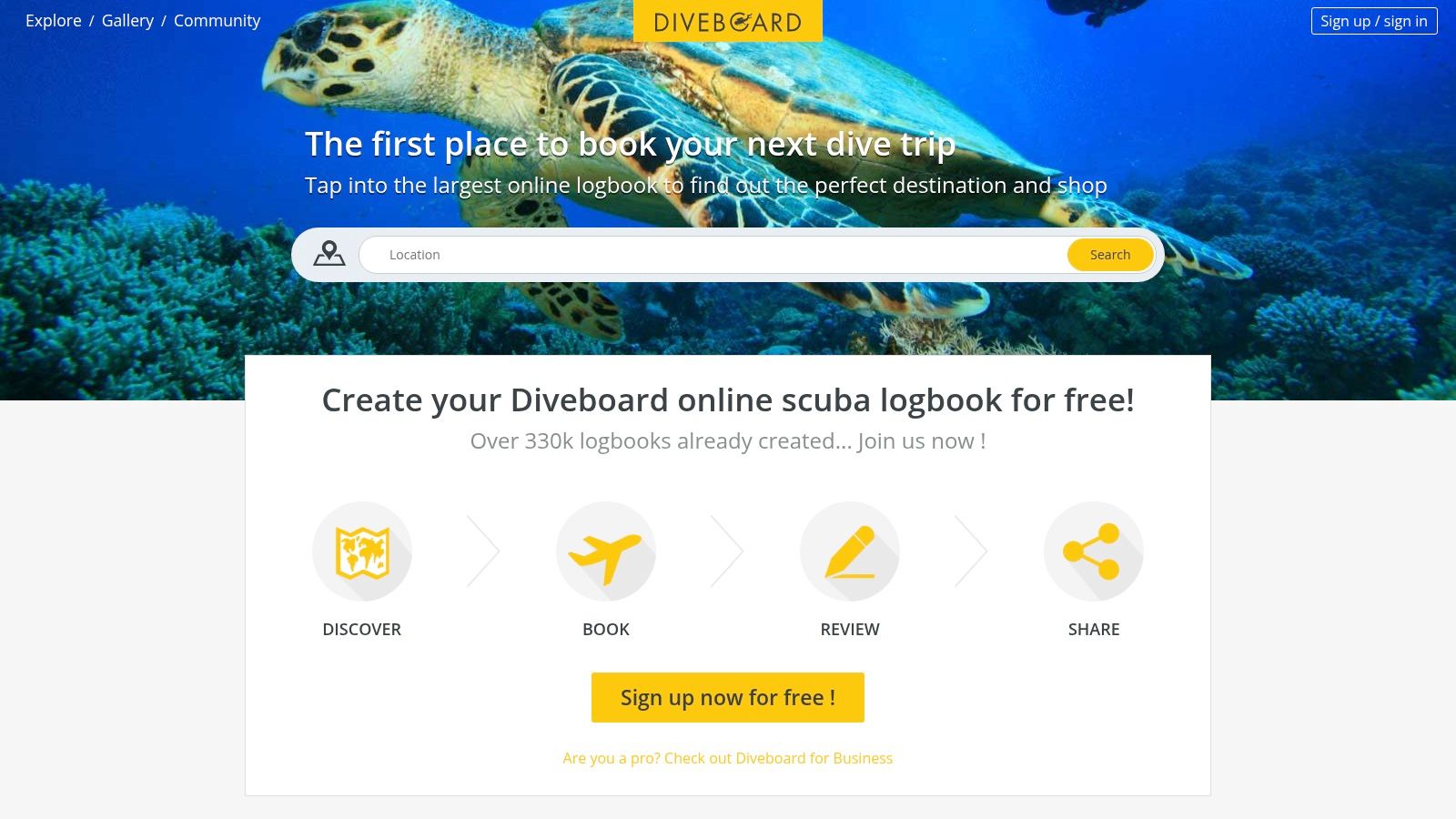Ready to Dive Deeper into Digital Logging?
Say goodbye to soggy paper logs! This list presents seven of the best dive log apps available in the UK, helping your dive centre streamline operations and improve the customer experience. Discover which dive log app best suits your needs, from basic dive tracking to advanced analytics and photo management. We’ll cover Dive Log, Subsurface Mobile, Dive+ Log, Deepblu, Diving Log, Divers Log, and DiveBoard – exploring features and benefits to help you choose the perfect digital solution. Many integrate seamlessly with dive centre management software, further reducing paperwork.
1. Dive Log
Dive Log (by Moby Free Diving) earns its top spot on our list of essential dive log apps for UK dive centres for its comprehensive tracking and analysis capabilities. This robust digital logbook goes far beyond simply recording your dives; it provides a powerful platform to meticulously document every aspect of your underwater experiences, catering to recreational, technical, and freediving disciplines. Whether you’re managing a team of instructors, tracking student progress, or simply enhancing your own diving practice, Dive Log offers a wealth of features to streamline your logging process. Learn more about Dive Log to see the depth of resources available.
One key strength of this dive log app lies in its customisable dive log templates, boasting over 100 fields to capture every conceivable detail. This granular approach allows dive centres to standardise data collection across all divers and provides a rich dataset for analysis. Imagine tracking not only the basic dive parameters like depth and time but also specific equipment used, gas mixtures, environmental conditions, and even wildlife sightings. This level of detail provides invaluable insights for improving dive safety protocols, understanding individual diver performance, and contributing to broader research initiatives.
Beyond logging, Dive Log shines with its detailed statistics and analysis features. Graphical representations visualise your dive data, enabling you to easily monitor progress, identify trends, and pinpoint areas for improvement. For dive centres, this feature can be instrumental in assessing student development, tracking instructor performance, and even identifying potential safety concerns.
While the extensive features contribute to a steeper learning curve, Dive Log makes up for it with robust offline functionality. You can log dives even without internet access, with the app seamlessly synchronising your data to the cloud once a connection is established. This is particularly useful for dives in remote locations common in the UK. Cloud synchronisation also ensures your valuable dive data is securely backed up and readily accessible across multiple devices. Dive Log’s regular updates and responsive developer support further enhance its reliability, offering peace of mind for dive centres handling sensitive data.
Key Features for Dive Centres:
- Customizable Dive Log Templates: Over 100 fields to capture comprehensive dive data.
- Support for All Diving Types: Caters to recreational, technical, and freediving.
- Detailed Statistics and Analysis: Graphical representations for easy data interpretation.
- Cloud Synchronization and Backup: Secure and accessible data across multiple devices.
- Equipment Maintenance Tracking: Helps manage equipment upkeep and ensure diver safety.
Pros:
- Extremely comprehensive data fields.
- Works offline with later sync capability.
- Regular updates and responsive developer support.
- Strong community of users.
Cons:
- Steeper learning curve due to extensive features.
- Premium features require a subscription (pricing details not publicly available).
- Interface can feel cluttered on smaller devices.
Website: https://divelog.net/
Dive Log is a powerful dive log app offering unparalleled data tracking and analysis. While the sheer number of features might feel overwhelming initially, the potential benefits for dive centres – from enhanced safety protocols to detailed performance tracking – make it a worthwhile investment. Consider Dive Log as a central hub for managing all your diving data, streamlining operations, and taking your dive centre to the next level.
2. Subsurface Mobile
Subsurface Mobile offers a powerful, free, and open-source solution for logging your dives, making it an excellent choice for dive centres seeking a robust and cost-effective dive log app. Developed initially by Linus Torvalds, the creator of Linux, this app boasts a clean interface and advanced features that cater to both recreational and technical divers. It’s particularly appealing for operations that value data ownership and transparency, given its open-source nature. For UK dive centres looking to streamline their logging processes, integrate dive computer data efficiently, and provide clients with a detailed record of their dives, Subsurface Mobile deserves serious consideration. It allows for meticulous record-keeping, which can be crucial for insurance purposes, incident reporting, and maintaining accurate profiles of diver experience within your centre.

One of the standout features of Subsurface Mobile is its seamless integration with a wide range of dive computers. This direct connectivity eliminates manual data entry, saving your dive centre time and reducing the potential for errors. The app supports GPS location services, allowing you to tag dive sites accurately and even integrate with mapping tools. Comprehensive dive statistics and profile visualization offer valuable insights into dive behaviour, gas consumption, and depth profiles, facilitating better dive planning and training. The cross-platform synchronization with the Subsurface desktop application further enhances its utility, providing a unified platform for managing dive logs across devices. Imagine your dive instructors being able to easily download and review student dive data on their laptops after a trip.
Subsurface Mobile is completely free, eliminating the need for in-app purchases or subscription fees, a significant advantage for dive centres operating on a budget. Regular updates through open-source development ensure that the app remains current and continues to improve. While the mobile version has fewer features than its desktop counterpart, it still provides the essential functionality required for efficient dive logging.
Implementation Tips for Dive Centres:
- Standardized Logging: Encourage all staff and customers to utilise Subsurface Mobile for consistent record-keeping across your dive centre.
- Dive Computer Compatibility: Verify compatibility with the dive computers used by your centre and customers before full implementation.
- Initial Cloud Setup: While the cloud synchronization can be initially challenging, the benefits of cross-platform access are substantial. Dedicate time to properly configure the cloud setup for seamless data transfer.
- Desktop Integration: Leverage the Subsurface desktop application for more in-depth analysis and reporting on dive data collected through the mobile app.
- Community Support: Take advantage of the open-source community forums for troubleshooting and sharing best practices.
Pros: Completely free, excellent dive profile visualization, strong dive computer integration, regular updates.
Cons: UI could be more polished, initial cloud synchronization setup can be tricky, mobile version has fewer features than the desktop version.
Website: https://subsurface-divelog.org/
3. Dive+ Log
Dive+ Log earns its spot on this list as a top-tier dive log app thanks to its elegant balance of simplicity and powerful features, particularly appealing to underwater photographers and dive centres looking for a streamlined logging experience. Its intuitive design makes it easy for both staff and customers to quickly record dives, freeing up valuable time for other tasks. If you’re looking for a visually appealing dive log app that doesn’t compromise on functionality, Dive+ Log is a strong contender.
This dive log app shines with its focus on a smooth, user-friendly experience. Imagine your divemasters or instructors, after a busy day leading dives, effortlessly inputting dive data with just a few taps thanks to one-tap dive entry with smart defaults. They can quickly select dive sites from interactive dive site maps and easily synchronise data from compatible dive computers from major brands. This efficient logging process allows your team to spend less time on administrative tasks and more time focusing on customer experience. Dive+ Log makes logging dives a breeze, even for those less technically inclined.
Beyond basic logging, Dive+ Log offers robust photo management capabilities that are particularly beneficial for underwater photography enthusiasts and professionals. The integrated photo correction and enhancement tools allow divers to quickly adjust and improve their underwater shots directly within the app, creating stunning visuals to share with clients or on social media. This feature is a real selling point for dive centers that offer underwater photography courses or excursions, providing a seamless workflow from capturing the image to sharing it with clients.
For dive centres operating in the UK, sharing dive information and connecting with the local diving community is made easy with Dive+ Log’s social sharing and community features. These capabilities can be leveraged to promote your dive centre, showcase exciting dives, and foster a sense of community amongst your customers. Imagine sharing stunning underwater photos captured by your team, tagged with your dive centre’s location and details, directly to social media platforms – a fantastic way to attract new customers.
While Dive+ Log excels in its ease of use and visual appeal, it’s worth noting a few limitations. The app’s support for technical diving is currently less comprehensive than some specialist dive log apps on the market. Some advanced features, such as detailed dive statistics and analytics, are locked behind a premium subscription. You’ll need to weigh the cost of the subscription against the value these features offer your dive centre. Pricing details are available on the Dive+ Log website. Technical requirements for the app are standard for most modern smartphones and tablets.
Pros:
- Beautiful, intuitive user interface
- Excellent photo management capabilities
- Fast and simple logging process
- Good balance of simplicity and features
- Social sharing and community features
Cons:
- More limited technical diving support
- Some advanced features require premium subscription
- Less detailed statistics than specialist competitors
Website: https://www.diveplusapp.com/
4. Deepblu
Deepblu stands out as a dive log app that goes beyond simple record-keeping by incorporating a vibrant social network tailored specifically for divers. This makes it an interesting option for dive centres looking to engage with their community and attract new customers. If you’re looking for a dive log app with a strong social component, Deepblu deserves a closer look.
This platform allows divers to create detailed digital dive logs, recording crucial information such as dive location, depth, time, and even equipment used. But Deepblu doesn’t stop there. It connects users with a global community of diving enthusiasts, fostering a space for sharing experiences, discovering new dive sites, and connecting with dive shops and professionals – like your own! Imagine showcasing your latest dive excursions and connecting with potential clients directly through the app.
Deepblu offers several key features relevant for both individual divers and dive centres:
- Social Network Integration: Connect with other divers, share photos and videos of your dives, and build a community around your dive centre. This feature can be invaluable for marketing your services and building brand loyalty.
- Digital Dive Verification System: Provides an extra layer of authenticity to logged dives, adding credibility for divers and potentially streamlining insurance claims.
- Dive Site Discovery and Recommendations: Helps divers find new and exciting dive locations, including those near your dive centre. You can even contribute information about your local dive spots, highlighting what makes them unique and attractive.
- Electronic Dive Certification Management: Allows divers to store and manage their certifications digitally, simplifying the check-in process at your dive centre.
- Direct Integration with COSMIQ+ Dive Computer: Streamlines the logging process by automatically syncing dive data from Deepblu’s own dive computer. While this integration is beneficial for those who own the COSMIQ+, it’s worth noting that the app functions perfectly well without it.
Deepblu’s free platform with no subscription required makes it accessible to a wider audience. For dive centres, this can be a powerful tool for reaching new customers and building a stronger online presence. You might want to learn more about Deepblu and explore how it can be integrated into your operations.
Pros:
- Strong community and social features offer excellent networking opportunities.
- Clean, modern interface makes the app easy to navigate and use.
- Great for discovering new dive sites and operations, benefiting both divers and dive centres.
- Free platform without any subscription fees, making it accessible to everyone.
Cons:
- The emphasis on social aspects can sometimes distract from the core dive logging functionality.
- While not required, the optimal experience is tied to using their proprietary COSMIQ+ dive computer.
- Extensive use of social features can be data-intensive and drain battery life.
Website: https://www.deepblu.com/
While Deepblu’s social focus might not suit every dive centre, its ability to connect businesses with a passionate diving community and promote local dive sites makes it a powerful tool. Consider how its features could enhance your marketing efforts and customer engagement within the UK diving scene.
5. Diving Log
Diving Log by Sven Knoch earns its spot on this list as a powerful and time-tested dive log app, ideal for serious divers and dive centres in the UK. With over two decades of development behind it, Diving Log offers an unmatched depth of features, catering to both recreational and technical diving needs. This mature platform shines in its meticulous logging capabilities, going far beyond basic dive tracking. Think of it as the professional’s choice, offering granular control and comprehensive data management for individuals and businesses alike.

For UK dive centres, Diving Log can be a valuable tool for managing client dives, tracking equipment usage, and maintaining detailed records for safety audits and insurance purposes. Imagine streamlining your operations with a centralised system that logs everything from student progress to equipment maintenance schedules. The extensive customisation options allow you to tailor the log fields and templates to your specific needs, ensuring you capture all essential information for each dive. Support for over 50 dive computer models with direct download simplifies the logging process for both staff and clients, eliminating manual entry and reducing errors. Detailed gas consumption analysis can help in planning future dives and optimising gas mixtures for various scenarios. The comprehensive equipment management system allows you to track certifications, servicing dates, and usage history for all your diving gear.
While the mobile app provides a solid platform for logging dives on the go and syncing with the desktop version, its interface might feel slightly less polished than some newer dive log apps. However, the true power of Diving Log lies in its desktop counterpart, which offers the full suite of features and advanced reporting tools. This allows dive centres to generate comprehensive reports on dive activities, equipment usage, and client certifications. This one-time purchase (rather than a subscription) is a long-term investment in a robust and reliable system.
Features:
- Support for over 50 dive computer models with direct download
- Extensive customisation of log fields and templates
- Detailed gas consumption analysis
- Comprehensive equipment management system
- Advanced statistics and reporting tools (desktop version)
Pros:
- Extremely mature and stable platform
- Highly detailed technical diving support
- Excellent import/export compatibility
- One-time purchase rather than subscription
Cons:
- Mobile interface is less modern than some competitors
- Steeper learning curve due to wealth of options
- Desktop version (separately purchased) is required for full functionality
Pricing: Contact the vendor directly for current pricing details for the desktop and mobile applications.
Technical Requirements: Specific technical requirements for both the desktop and mobile versions can be found on the Diving Log website.
Website: https://divinglog.de/
Implementation Tip: Set aside some time to explore the extensive customisation options available within Diving Log. Properly configuring the system to your dive centre’s needs will maximize its effectiveness and streamline your operations. Consider beginning with the desktop version to fully grasp the capabilities of the software before deploying the mobile app to clients and staff.
6. Divers Log
Divers Log (by Anton Britikov) earns its place on this list as a robust yet user-friendly dive log app perfect for a range of divers, particularly those new to digital logging. It offers dive centres in the UK a straightforward solution for their customers looking to easily record and track their dives. If you’re seeking a dive log app that balances comprehensive data tracking with a clean, intuitive interface, Divers Log is worth exploring.
This dive log app focuses on streamlined data entry and clear visualization, making logging quick and painless even after a long day of diving. Forget cumbersome spreadsheets or paper logs; Divers Log lets you quickly input key data using pre-built templates for common dive profiles. Imagine your divers easily inputting their information after a day exploring the wrecks off Scapa Flow, or documenting their dives amidst the vibrant marine life of the Lundy Island Marine Nature Reserve.
Divers Log automatically calculates critical safety metrics, such as surface intervals and no-decompression limits, helping divers stay aware of their dive profiles and plan their dives safely. This automated calculation feature minimizes manual calculations and reduces the risk of errors, providing an extra layer of safety for your clients. The app also generates detailed statistics about your diving history, allowing you to track your progress and identify trends over time. You can easily review dive depths, bottom times, and other important metrics, building a comprehensive record of your diving experiences.
Key features that will benefit your divers include quick-entry templates, automatic safety calculations for surface intervals, detailed dive profile visualisation, buddies and dive site management, and photo and equipment integration. This last feature is particularly useful for tracking gear maintenance and ensuring your divers’ equipment is always in top condition. Learn more about Divers Log to see how its features can support your dive centre’s operations.
Pros:
- Clean, intuitive interface requiring minimal training, perfect for divers of all skill levels.
- Good balance of simplicity and detailed logging.
- Regular updates with new features demonstrating ongoing development and support.
- Affordable one-time purchase for the premium version (pricing information not publicly available, check the app store for details).
Cons:
- Fewer advanced technical diving features compared to some competitors, which might limit its appeal for tec divers.
- Limited dive computer integration compared to some alternatives.
- Some users report occasional syncing issues, so consistent data backup is recommended.
While Divers Log may have some limitations for highly technical dives, its focus on simplicity, user-friendliness, and core dive logging functionality makes it an excellent option for recreational divers and a great tool to recommend to those joining your dive centre. It offers a practical and convenient way to manage dive logs digitally. The app is available for mobile devices. Technical requirements will vary depending on the operating system, but most modern smartphones should be compatible. Check the respective app store (Apple App Store or Google Play Store) for the latest compatibility information.
The Divers Log website (https://diverslogapp.com/) offers more details and screenshots. This dive log app deserves a spot on this list because of its ease of use and focus on providing a streamlined, effective logging experience. It’s a solid choice for divers who want a comprehensive digital logbook without unnecessary complexity.
7. DiveBoard
DiveBoard stands out as a dive log app that caters specifically to the adventurous diver, focusing on exploration and community engagement. Unlike purely logbook-centric apps, DiveBoard combines personal dive logging with a comprehensive global dive site database and a social platform. This makes it an excellent choice for divers in the UK looking to explore new dive sites, whether at home or abroad, and connect with other divers. It’s particularly useful for dive centres looking to recommend local dive sites to their customers.

As a dive centre in the UK, you can leverage DiveBoard’s extensive database to showcase local dive sites and attract new customers. The interactive mapping feature allows you to pinpoint locations, highlight points of interest (like wrecks or reefs), and even document marine life sightings, enriching the experience for your clients. Imagine a potential customer exploring DiveBoard, discovering a fascinating wreck dive near your location, and then booking a dive with your centre directly through the app.
DiveBoard also offers integration with dive centres and professionals, allowing for automatic logging of verified dives. This streamlines the logging process for both your staff and customers, reducing administrative overhead and ensuring accurate records. Customers can simply verify their dives with you through the app, and the dive details are automatically added to their logbook. This feature also adds a layer of credibility to your centre’s offerings.
Furthermore, the digital certification validation feature can be a handy tool for verifying your customers’ qualifications quickly and efficiently. No more paper logbooks!
Key Features for Dive Centres:
- Extensive global dive site database: Promote local dive spots and expand your reach to a wider audience.
- Dive center integration: Streamline the dive logging process and offer a convenient service to your customers.
- Digital certification validation: Quickly and easily verify customer certifications.
- Community reviews and recommendations: Leverage positive reviews to build your centre’s reputation.
- Interactive mapping: Highlight local dive sites and points of interest for potential customers.
Pros:
- Excellent for travellers and discovering new dive sites: Great for attracting divers looking to explore new locations.
- Strong community-driven content: Provides social proof and builds trust.
- Good integration with dive operators: Simplifies the logging and verification process.
- User-friendly interface focusing on visual elements: Makes it easy for both staff and customers to use.
Cons:
- Core logging features less comprehensive than specialist logging apps: Might not be suitable for highly technical diving operations that require very specific data logging capabilities.
- Requires internet connection for many features: Can be a limitation in remote locations.
- Less detailed technical diving support: May lack advanced features required by technical divers.
- Advertising can be intrusive in the free version: Consider a paid subscription for a smoother experience.
Website: https://www.diveboard.com/
While pricing and technical requirements are not explicitly stated, DiveBoard likely offers both free and paid versions with varying feature sets, as hinted by the mention of intrusive ads in the free version. Check their website for the most up-to-date information on pricing and platform compatibility.
DiveBoard’s focus on discovery and community, combined with its dive centre integration, makes it a valuable tool for dive operators in the UK looking to connect with new customers and enhance their overall diving experience. While it might not be the most comprehensive solution for highly technical dives, it offers a compelling combination of social features and practical tools that make it a worthy contender in the dive log app market.
7 Dive Log Apps: Quick Feature Comparison
| Product | Core Features ★ | Unique Selling Points ✨ | Value & Pricing 💰 | Target Audience 👥 |
|---|---|---|---|---|
| Dive Log | 100+ custom fields, analytics, cloud sync | Extremely comprehensive data & community support | Advanced (premium subscription required) | Recreational, technical & freedivers |
| Subsurface Mobile | Dive computer connectivity, GPS mapping, cross-platform sync | Open-source excellence with robust integration | Free, but cloud sync setup can be tricky | Advanced users & tech-savvy divers |
| Dive+ Log | One-tap entry, photo enhancement, interactive mapping | Beautiful, intuitive design with social sharing | Free core with optional premium upgrade | Underwater photographers & casual divers |
| Deepblu | Social network, digital dive verification, site discovery | Global community & direct COSMIQ+ integration | Free, though best with proprietary dive computer | Social divers & dive center professionals |
| Diving Log | Support for 50+ dive computers, customizable templates, gas analysis | Mature, stable platform with technical depth | One-time purchase (mobile); desktop version extra cost | Experienced & technical divers |
| Divers Log | Quick-entry templates, automatic safety calculations | Clean interface balancing simplicity & detail | Affordable one-time premium purchase | Beginners & regular divers |
| DiveBoard | Global dive site database, certification validation, interactive maps | Strong mapping & community reviews | Free with ads; requires Internet connectivity | Travelers & dive site explorers |
Choosing the Right Dive Log App for You
Finding the perfect dive log app can significantly enhance your underwater adventures and streamline your record-keeping. We’ve explored seven leading options, from the simplicity of Dive Log to the community focus of Deepblu, and the comprehensive features of Subsurface Mobile, Dive+ Log, Diving Log, Divers Log, and DiveBoard. Each caters to different needs and preferences, so the best dive log app for you depends on your specific requirements.
Key takeaways include considering your diving style (recreational, technical, etc.), essential features (dive planning, gas mixes, equipment tracking), platform compatibility (iOS, Android), and budget. Some apps excel at detailed log analysis, while others shine in social sharing and dive site discovery. Remember that the ideal dive log app should seamlessly integrate into your diving experience, making logging easy and enjoyable.
For UK dive centres looking to optimise their operations and improve customer experience, choosing the right dive log app for your clients can be invaluable. Compatibility between individual divers’ apps and your centre’s management system is crucial. Dive Admin offers a powerful SaaS solution designed to integrate seamlessly with many popular dive log apps, simplifying administrative tasks and improving communication. Streamline your dive centre operations and elevate the diver experience with Dive Admin. Learn more and book a demo at Dive Admin.


